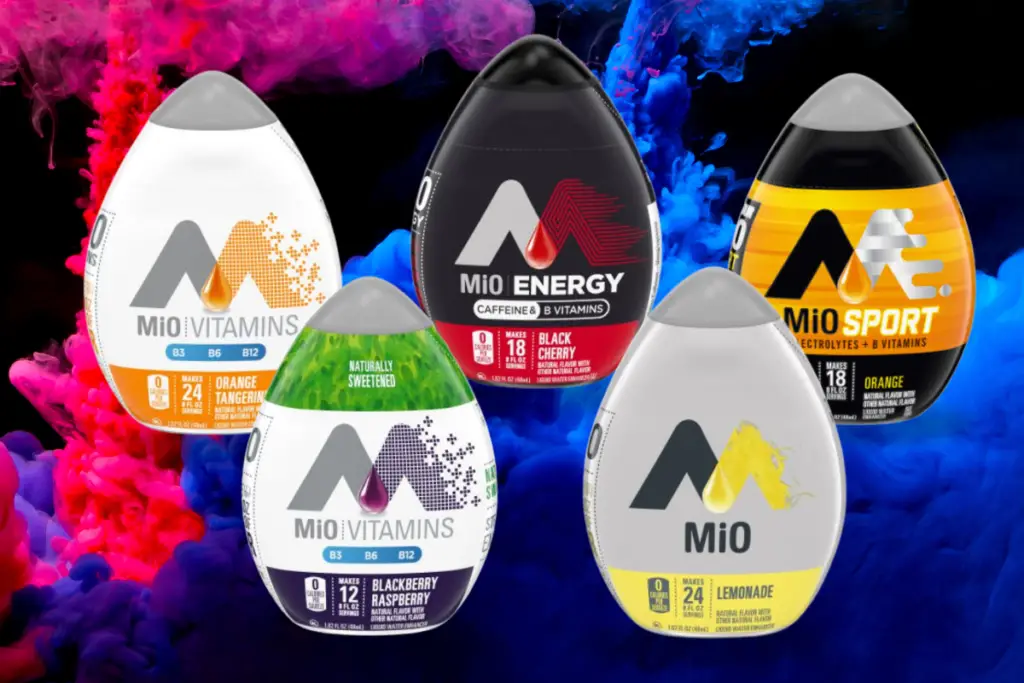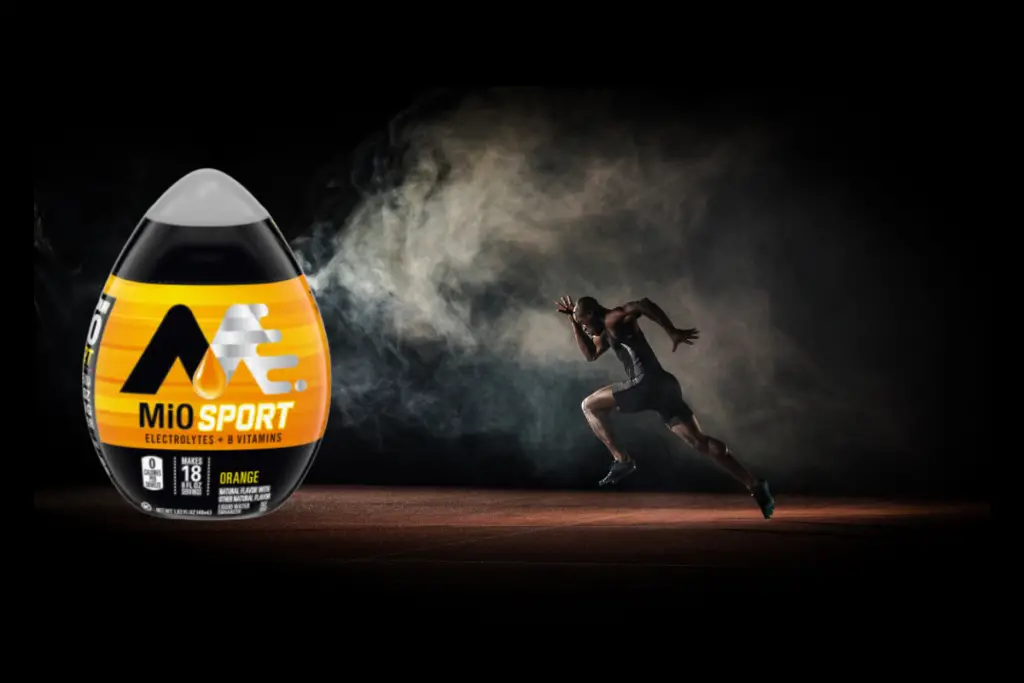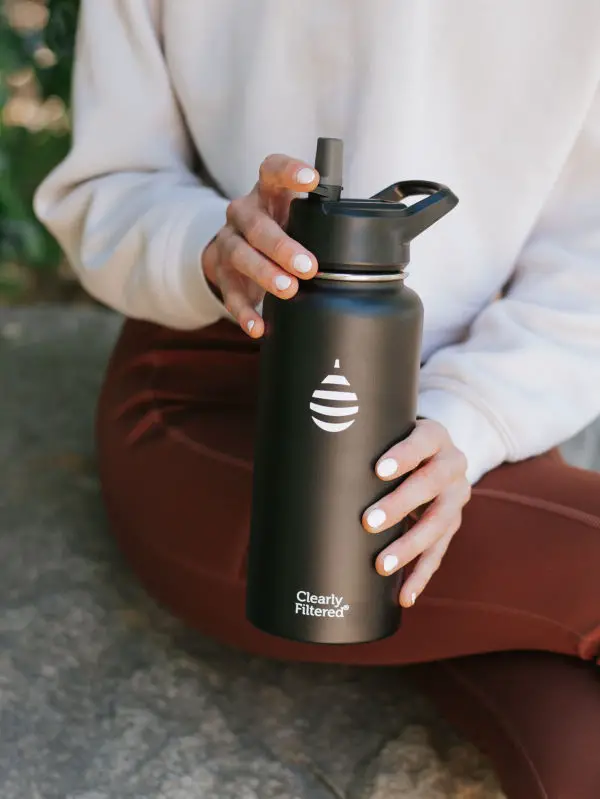MiO water enhancers are a popular choice for anyone seeking an alternative to plain water. However, with their surge in popularity comes a growing curiosity about the health implications of MiO water enhancers, particularly given their use of artificial sweeteners and other additives.
In this post, we will delve into the world of MiO water enhancers, exploring their ingredients, potential health benefits, concerns, and alternatives.
Composition of MiO

MIO Ingredients and Their Roles
Let’s start by dissecting what MiO is made of.
MiO is marketed as a zero-sugar, zero-calorie liquid water enhancer. But where does its flavor and sweetness come from?
The primary culprits are artificial sweeteners, with sucralose and acesulfame potassium (Ace-K) taking center stage. These artificial sweeteners provide MiO with its sweet taste without adding extra sugar and calories, making it an appealing choice for those looking to cut down on sugar intake.
Some MiO products contain stevia leaf extract, a plant-based sweetener known for being significantly sweeter than sugar without causing tooth decay. Stevia has also demonstrated potential health benefits, including anti-inflammatory, antidiabetic, and antioxidant properties.
However, MiO isn’t just about sweetness.
It also contains food colorings (dyes) and preservatives like red 40, yellow 5, yellow 6, blue 1, potassium sorbate, citric acid, and propylene glycol.
While these additives are deemed safe by the Food and Drug Administration (FDA), concerns have been raised about their long-term effects.
Caffeine and Other Components
The MiO Energy line adds caffeine to the mix, making it an option for those seeking an energy boost. Each squeeze of MiO Energy provides approximately 60 mg of caffeine, which falls slightly below the caffeine content found in an average 8-oz cup of coffee or even a single shot of espresso at Starbucks. In essence, it’s a moderate caffeine dose.
Ginseng, taurine, and guarana are also present in MiO Energy flavors.
MiO product lines including MiO Original, MiO Energy, MiO Vitamins, and MiO Sport provide about 10% of the recommended daily intake of vitamins B3, B6, and B12, adding a potential health boost to your hydration routine.
Advantages of MiO
Zero Sugar and Calories
One of MiO’s most significant selling points is its zero-sugar, zero-calorie nature. For individuals aiming to reduce their sugar and calorie intake, MiO provides a flavorful alternative to plain water without the guilt.
Weight Management
MiO’s calorie-free status can be especially appealing to those watching their weight. Caloric beverages, such as sodas and sugary drinks, can contribute to weight gain or hinder weight loss efforts. Replacing these high-calorie options with MiO can be a step toward achieving weight management goals.
Diabetes-Friendly
Individuals with diabetes often need to be cautious about their sugar intake. MiO’s lack of sugar makes it a suitable choice for those looking to enjoy a sweet-tasting beverage without causing spikes in blood sugar levels.
Concerns Surrounding MiO
Artificial Sweeteners: Sucralose and Ace-K
Despite their widespread use, artificial sweeteners like sucralose and acesulfame potassium remain a topic of debate. Some studies suggest that regular consumption of these sweeteners may have unintended health effects. For example, research has shown that acesulfame potassium (Ace-K) could potentially disrupt the gut microbiome, a critical player in various bodily processes.
Weight Management Debate
While MiO can aid in weight management by reducing calorie intake from beverages, some studies have raised concerns that artificial sweeteners like sucralose might paradoxically contribute to weight gain. It was initially believed that these sweeteners were indigestible and incapable of raising blood sugar levels. However, recent findings suggest that sucralose may affect blood sugar and insulin levels in some individuals.
Blood Sugar Effects
For people with diabetes or those at risk of diabetes, managing blood sugar levels is crucial. Artificial sweeteners can have varying effects on blood sugar, with some studies suggesting that they may cause fluctuations, especially in individuals with severe obesity. The impact of these sweeteners on long-term blood sugar control is an area of ongoing research.
Citric Acid and Propylene Glycol
MiO’s use of citric acid and propylene glycol, while generally recognized as safe, has raised questions about their long-term effects.
Artificial Food Dyes
Artificial food dyes have long been a topic of concern and debate in the realm of food and nutrition. All MiO products contain artificial food dyes, which are summarized in the table below:


Red 40, also known as Allura Red AC, is a widely used artificial food dye commonly found in MiO products. However, Red 40 has been a subject of scrutiny for its potential link to hyperactivity, particularly in children. Some studies have suggested that this dye might contribute to increased restlessness and inattention, especially in kids diagnosed with attention deficit hyperactivity disorder (ADHD).
For water flavorings without Red 40 – read this post.

Yellow 5, or Tartrazine, is another artificial food dye in MiO. Like Red 40, Yellow 5 has also been associated with hyperactivity in children, although the scientific consensus on this matter remains inconclusive. Some individuals may experience allergic reactions to Yellow 5, which could manifest as skin rashes or itching.

Yellow 6, also known as Sunset Yellow FCF, is an artificial food dye used in some MiO products. Much like Yellow 5 and Red 40, Yellow 6 has raised concerns about its potential link to hyperactivity, particularly in children. Some studies have suggested that the consumption of Yellow 6 may contribute to increased restlessness and attention-related issues in sensitive individuals.

Blue 1, also known as Brilliant Blue FCF or E133, is another artificial food dye used to provide a vibrant blue color to many MiO products. Unlike the other food dyes in MiO, Blue 1 has not been associated with hyperactivity or behavioral concerns to the same extent. However, some studies have raised questions about the safety of Blue 1, particularly in high doses. These studies have suggested possible links to adverse effects on neural and behavioral functions, although further research is needed to establish conclusive evidence.
While the food dyes in MiO are deemed safe for consumption by regulatory agencies like the FDA, their potential effects on behavior and health continue to be researched and debated. As a result, some individuals may choose to avoid MiO products, opting for natural alternatives or products that use other colorings.
For water flavorings without food coloring – read this post.
Exploring Alternative Hydration Options
While MiO offers a convenient way to flavor water, it’s essential to explore alternative options for those concerned about artificial additives or looking for variety in their hydration options to plain water:
1. Coconut Water: Coconut water is a natural and refreshing choice for hydration. It’s rich in electrolytes like potassium – In fact, popular brands of coconut water, such asVita Coco and Zico coconut water, contain more than 10 times more potassium than MiO Sport (per fl. oz). Coconut water also contains natural sugars making it an excellent option for rehydrating after exercise or on a hot day.
2. Herbal Infusions: Herbal teas such as chamomile, peppermint, and hibiscus are flavorful and can be caffeine-free alternatives for a morning energy boost. They offer various health benefits and can be enjoyed hot or cold.
3. Infused Water: Create your own flavored water by infusing it with fruits, vegetables, or herbs. Common combinations include cucumber and mint, lemon and ginger, or berries and basil. This adds a burst of natural flavor without added sugars.
4. Electrolyte Drinks: Electrolyte beverages like sports drinks or electrolyte tablets can help replenish lost electrolytes during intense physical activity. Popular brands such as Gatorade, Powerade and Vitamin Water even contain more electrolytes than MiO Sport. However, be mindful as some can contain high levels of sugar, so reserve them for situations that require quick electrolyte recovery.
5. Mineral Water: Mineral water is a natural and refreshing choice known for its rich mineral content, including calcium, magnesium, and potassium. These minerals can contribute to overall health by supporting bone strength and muscle function. Additionally, the effervescence in some mineral waters adds a pleasant fizziness to your drink, making it an enjoyable alternative to just plain water.
Evaluation and Final Verdict
MiO water enhancers have their merits, such as being sugar-free and calorie-free, which can benefit those aiming for weight management or sugar control. However, concerns about artificial sweeteners, their effects on the gut microbiome, and potential links to weight gain and blood sugar fluctuations warrant thoughtful consideration. The addition of food dyes may be of concern for some consumers.
In the end, the choice to consume MiO should align with your personal health goals and preferences. It’s also important to explore alternative hydration options that provide flavor without artificial additives.
Common Queries
Is MiO Bad For Diabetics?
MiO’s zero-sugar nature makes it a suitable choice for individuals with diabetes, but its use of artificial sweeteners may require moderation and monitoring of individual blood sugar responses.
Is MiO a Good Soda Alternative?
MiO can serve as a better alternative to sugary sodas for those seeking a calorie-free and sugar-free option. However, its long-term effects, particularly regarding weight management, should be considered.
What Is MiO Sweetened With?
MiO uses artificial sweeteners sucralose and acesulfame potassium (Ace-K) to provide sweetness without calories.
Is Mio Good For Sports Performance?
MiO Sports

MiO offers a sports-specific water enhancer (MiO Sport – previously called “MiO Electrolytes”). It contains some electrolytes and B-vitamins. However, I wouldn’t say that it is packed with electrolytes.
For an 8 fl oz serving of MiO Sport – one squeeze of the bottle – there is 75 mg of Sodium and 35 mg of Potassium. To put this in perspective, Gatorade has over 3 times more sodium and 2 times more potassium than Mio Sport (per fl oz.). Powerade and Vitamin Water (Refresh Tropical Mango Flavor) also have higher electrolyte contents than MiO Sport per fl oz.
What about caffeinated MiO – MiO Energy
The debate surrounding whether caffeine can enhance anaerobic or aerobic ability has persisted for some time.
MiO Sport does not contain caffeine, but MiO Energy does.
An interesting study compared the VO2 max (representing aerobic energy output capacity) among physically active males who consumed either caffeinated or non-caffeinated versions of MiO. I’m sure many of you are hoping the caffeine in MiO increased their VO2 max, but unfortunately, there was no significant difference in peak power following the consumption of MiO Energy when compared to the regular (caffeine-free) MiO liquid water enhancer.
So, if you’re trying to boost your athletic ability with MiO, you’re probably better off sticking with the MiO Sport line.
Which Mio Products Use Stevia?
An easy way to tell which MiO products use Stevia is they are labelled as “sweetened”. MiO flavors that are naturally sweetened with Stevia include MiO Tropical Cherry and MiO Vitamins Strawberry Orange.
Does Mio Have Aspartame?
MiO does not contain aspartame as one of its sweeteners. The primary artificial sweeteners used in MiO are sucralose and acesulfame potassium (Ace-K).
There are also plenty of other great water flavorings that don’t contain aspartame in this post.
Conclusion
MiO water enhancers offer a convenient way to add flavor to your water without the drawbacks of sugar and calories. Many consumers love the range of flavors and taste of MiO. However, the use of artificial sweeteners and other additives has raised concerns that require ongoing research.
As a consumer, it’s essential to make informed choices based on your health goals and preferences. Exploring natural water flavoring alternatives can also enhance your hydration experience while avoiding artificial additives. Ultimately, the decision to include MiO in your hydration routine should align with your unique needs and priorities.
The Best Water Filter Bottle We’ve Ever Used
Clearly Filtered | Stainless Steel Filter Bottles
We really love these filter bottles for keeping your drinks cool and contaminant free! They remove 99.9% of over 220 contaminants and use BPA-free plastics and double-walled stainless steel to produce some awesome looking designs with numerous bottle sizes for every situation. You can find them at Clearlyfiltered.com

